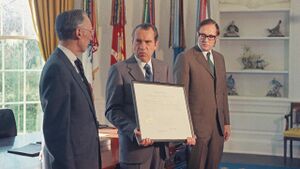Lewis Powell
(judge) | |
|---|---|
 | |
| Born | Lewis Franklin Powell Jr. 1907-09-19 Suffolk, Virginia, U.S. |
| Died | 1998-08-25 (Age 90) Richmond, Virginia, U.S. |
| Alma mater | Harvard University |
| Party | Democratic |
Lewis Powell is the author of a 1971 memorandum to the influential U.S. Chamber of Commerce, making a long-term blueprint for a corporate domination of the US economic system, and inspiring the rise of neoliberalism globally.[1]
Powell Memorandum, 1971
On 23 August 1971, prior to accepting President Nixon's nomination to the US Supreme Court, Lewis Powell was commissioned by his neighbour Eugene B. Sydnor Jr., a close friend and education director of the U.S. Chamber of Commerce, to write a confidential memorandum for the chamber entitled "Attack on the American Free Enterprise System," an anti-Communist and anti-New Deal blueprint for conservative business interests to retake America. It was based in part on Powell's reaction to the work of activist Ralph Nader, whose 1965 exposé on General Motors, "Unsafe at Any Speed", put a focus on the auto industry putting profit ahead of safety, which triggered the American consumer movement. Powell saw it as an undermining of the power of private business and a step toward socialism.
Neoliberal inspiration
The Powell Memorandum ultimately came to be a blueprint for the rise of the American conservative movement and the formation of a network of influential right-wing think tanks and lobbying organisations, such as the Business Roundtable, The Heritage Foundation, the Cato Institute, Manhattan Institute for Policy Research and the American Legislative Exchange Council (ALEC), and inspired the U.S. Chamber of Commerce to become far more politically active.
City University of New York professor David Harvey traces the rise of neoliberalism in the US to this memo.[2] Historian Gary Gerstle refers to the memo as "a neoliberal call to arms."[3]
Conclusion
The 34-page Powell Memorandum concludes:
It hardly need be said that the views expressed above are tentative and suggestive. The first step should be a thorough study. But this would be an exercise in futility unless the Board of Directors of the Chamber accepts the fundamental premise of this paper, namely, that business and the enterprise system are in deep trouble, and the hour is late.[4]